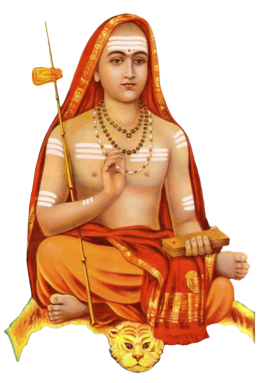सूत्रप्रायो निगूढार्थो ज्ञातव्यश्च मुमुक्षुभिः ॥ ६७ ॥
sūtraprāyo nigūḍhārtho jñātavyaśca mumukṣubhiḥ || 67 ||
तदेतच्छ्रवणात्सद्यो भवबन्धाद्विमोक्ष्यसे ॥ ६८ ॥
tadetacchravaṇātsadyo bhavabandhādvimokṣyase || 68 ||
वैराग्यमत्यन्तमनित्यवस्तुषु ।
ततः शमश्चापि दमस्तितिक्षा
न्यासः प्रसक्ताखिलकर्मणां भृशम् ॥ ६९ ॥
vairāgyamatyantamanityavastuṣu |
tataḥ śamaścāpi damastitikṣā
nyāsaḥ prasaktākhilakarmaṇāṃ bhṛśam || 69 ||
All work: all work done with motive, including the good ones prescribed in the Shastras and those that are evil—which men do prompted by their own nature.
ध्यानं चिरं नित्यनिरन्तरं मुनेः ।
ततोऽविकल्पं परमेत्य विद्वान्
इहैव निर्वाणसुखं समृच्छति ॥ ७0 ॥
dhyānaṃ ciraṃ nityanirantaraṃ muneḥ |
tato’vikalpaṃ parametya vidvān
ihaiva nirvāṇasukhaṃ samṛcchati || 70 ||
Hearing—of the Truth from the lips of the Guru.
Meditation—the flowing of the mind in one unbroken stream towards one object.
Muni—the man of reflection.
Nirvikalpa state—that state of the mind in which there is no distinction between subject and object—all the mental activiti es are held in suspension, and the aspirant is one with his Atman. It is a. s uperco n scious sta te, beyond all re lativity, which can be felt by the fortunate seeker, but cannot be described in words. The utmost that can be said of it is that it is inexpressible Bliss, and Pure Consciousness. Nirvâna, which literally means ‘blown out,’ is another name for this.
तदुच्यते मया सम्यक्श्रुत्वात्मन्यवधारय ॥ ७१ ॥
taducyate mayā samyakśrutvātmanyavadhāraya || 71 ||
Vivekachudamani – Introduction
1: Devoted Dedication
2: Glory of Spiritual Life
3: Unique Graces in Life
4-7: Miseries of The Unspiritual Man
8-13: Means of Wisdom
14-17: The Fit Student
18-30: The Four Qualifications
31: Bhakti – Firm and Deep
32-40: Courtesy of Approach and Questioning
41-47: Loving Advice of the Guru
48-49: Questions of the Disciple
50: Intelligent Disciple – Appreciated
51-55: Glory of Self-Effort
56-61: Knowledge of the Self-Its Beauty
62-66: Direct Experience – Liberation
67-71: Discussion on Questions Raised
72-75: Gross Body
76-82: Sense Objects a Trap – Man Bound
83-86: Fascination for Body Criticised
87-91: Gross Body Condemned
92: Organs of Perception and Action
93-94: Inner Instruments
95: The Five Pranas
96-101: Subtle Body – Effects
102: Functions of Prāna
103-105: Ego Discussed
106-107: Infinite Love – the Self
108-110: Māyā – Pointed Out
111-112: Rajoguņa – Nature and Effects
113-116: Tamoguņa – Nature and Effects
117-119: Sattvaguņa – Nature and Effects
120-121: The Causal Body – Its Nature
122-123: Not-Self – Description
124-135: The Self – Its Nature
136: Advice for Self-control
137-142: What is Bondage – The Reply
143-144: The Powers – Agitation and Veiling
145-146: Bondage in Action
147-153: Ātman and Anātman – Discrimination
Negation of the Kośas
154-164: – Annamaya kośa (Food sheath)
165-166: – Prņamaya kośa (Vital air sheath)
167-183: – Manomaya kosa (Mental sheath)
184-188: – Vijnanamaya kośa (Intellectual sheath)
189-191: Ātman – Unattached
192-193: What is Liberation? – Disciple
194-206: Self-Knowledge gives Liberation
207-210: Anandamaya kośa (Bliss sheath)
211: Ātman – Other than the Five Kośas
212: What is Ātman? – Disciple
213-225: Nature of the Self – Discussion
226-236: All Manifestation Absolute
237-240: Brahman – Its Nature
241-249: That Thou Art – Explanation
250-253: Attitude in Meditation
254-266: Aids to Meditation
267-276: Give up Vāsanās – the Method
277-292: End Superimposition – The Means
293-297: The Perceived I’ Factor – False
298-309: Condemnation of the Ego
310-319: Actions, Thoughts and Vāsanās – Renounce
320-329: Total Vigilance – Its Price
330-338: In the One, No Plurality
339-348: Spiritual Growth – the Secret
349-353: Cause-Effect – False
354-372: Samadhi – Its Nature
373-378: Fully Detached – Samadhi Easy
379-383: Meditation – the Technique
384-397: Continuous Attention to Self
398-406: No Diversity in Reality
407-413: Ātma-vicāra – Contemplation
414-418: Give up Perceptions
419-425: The Science of Reality – Its Benefits
426-445: Signs of a Realised Seer
446-464: Prārabdha for a Saint
465-471: There is No Plurality
472-479: Experience of Selfhood
480-520: Practice of Knowledge – Disciple
521-575: Final Words of Advice
576-578: Blessed Disciple Liberated
579-581: The Glory of the Textbook

Vivekachudamani – Verses 67-71 – Vivekachudamani Verses 67-71 – By Adi Sankaracharya – In Sanskrit with English Meaning, Transliteration, Translation, Commenary, Lyrics, Audio – Vivekachudamani-67-71
